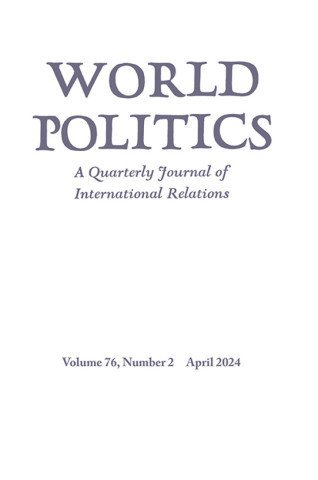大期望:民主在贸易态度上的优势
IF 2.5
1区 社会学
Q1 INTERNATIONAL RELATIONS
引用次数: 8
摘要
为什么与某些国家的贸易比与其他国家的贸易更受欢迎?作者将有关政权类型和贸易合作的文献与有关贸易态度的文献联系起来,认为国内政治制度和外国的合作声誉决定了公众和政策精英深化贸易合作的意愿。通过对美国公众和美国对外经济政策制定者的独特样本进行调查实验,作者表明,受访者更喜欢与民主国家进行贸易,而不是与非民主国家进行贸易。此外,他们发现这种民主优势源于一种强烈的期望,即民主国家将成为更可靠、更一致的合作伙伴。这项研究为政体类型和国际合作的政治经济学理论的基础机制提供了第一个直接和因果关系确定的测试之一。虽然这篇文章关注的是贸易态度的问题,但其论点是一般性的,表明对其他问题领域合作的支持取决于类似的因素。本文章由计算机程序翻译,如有差异,请以英文原文为准。
Great Expectations: The Democratic Advantage in Trade Attitudes
abstract:Why is trade with some countries more popular than with others? Linking the literature on regime type and trade cooperation with the literature on trade attitudes, the authors argue that the domestic political institutions and cooperative reputations of foreign states condition the willingness of the public and policy elites to deepen trade cooperation. Using survey experiments fielded on the American public and a unique sample of US foreign economic policymakers, the authors show that respondents prefer trade with democracies over trade with nondemocracies by large margins. Further, they find that this democratic advantage stems from a strong expectation that democracies will be more reliable and consistent cooperation partners. This study provides one of the first direct and causally identified tests of the mechanisms underlying theories of the political economy of regime type and international cooperation. Although the article focuses on the case of trade attitudes, the argument is general, suggesting that support for cooperation in other issue areas is conditional on similar factors.
求助全文
通过发布文献求助,成功后即可免费获取论文全文。
去求助
来源期刊

World Politics
Multiple-
CiteScore
8.40
自引率
0.00%
发文量
24
期刊介绍:
World Politics, founded in 1948, is an internationally renowned quarterly journal of political science published in both print and online versions. Open to contributions by scholars, World Politics invites submission of research articles that make theoretical and empirical contributions to the literature, review articles, and research notes bearing on problems in international relations and comparative politics. The journal does not publish articles on current affairs, policy pieces, or narratives of a journalistic nature. Articles submitted for consideration are unsolicited, except for review articles, which are usually commissioned. Published for the Princeton Institute for International and Regional Affairs
 求助内容:
求助内容: 应助结果提醒方式:
应助结果提醒方式:


